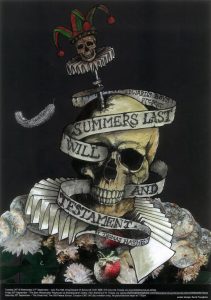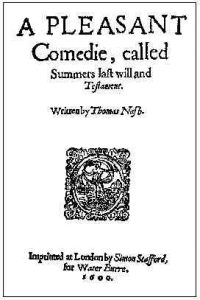Now the autumn equinox has passed summer is really over and it’s fitting that the boy players of Shakespeare’s School, Edward’s Boys, are performing Thomas Nashe’s play Summer’s Last Will and Testament at the end of September 2017.
The play was written during the autumn of 1592 as an entertainment for Archbishop Whitgift and his guests who were sheltering in the safety of his palace in Croydon while plague was rampant in London. The play focuses on the end of summer and the coming of winter, but unspoken parallels with the turbulent times in which it was written and performed are clear. Part play, part pageant, part masque, the seasons are personified and the other characters such as Morris dancers, the hobby horse and Christmas give it a strong pastoral feel that Shakespeareans will recognise from As You Like It.
It has a simple structure. Summer has been the “King of the world” but, weakening, needs to pass on his legacy. Death, as winter, stalks the play, and there is a sense that the established ways are being threatened by something darker. Early in the play the allegorical figure of Summer enters, leaning on Autumn and Winter’s shoulders, and speaks:
Fair Summer droops, droop men and beasts therefore:
So fair a summer look for never more.
All good things vanish less than in a day,
Peace, plenty, pleasure, suddenly decay.
Go not yet away, bright soul of the sad year;
The earth is hell when thou leavest to appear….
What, shall those flowers that decked thy garland erst,
Upon thy grave be wastefully dispersed?
O trees, consume your sap in sorrow’s course,
Streams, turn to tears your tributary course.
Go not yet hence, bright soul of the sad year;
The earth is hell when thou leav’st to appear.
Summer orders Autumn and Winter to be kind to Queen Elizabeth:
Autumn, I charge thee, when that I am dead,
Be prest and serviceable at her beck;
Present her with thy goodliest ripened fruits,
Unclothe no arbours where she ever sat,
Touch not a tree thou think’st she may pass by;
And Winter, with thy writhen frosty face,
Smooth up thy visage when thou look’st on her,
Thou never look’st on such bright majesty;
A charmed circle draw about her court
Wherein warm days may dance, & no cold come;
On seas let winds make war, not vex her rest;
Quiet enclose her bed, thought fly her breast.
Having heard from all his potential heirs, Summer passes his crown to Autumn, and Summer finally makes his farewell. As he is carried away this song is sung:
Autumn hath all the summer’s fruitful treasure,
Gone is our sport, fled is poor Croyden’s pleasure,
Short days, sharp days, long nights come on apace,
Ah, who shall hide us from the winter’s face?
Cold doth increase, the sickness will not cease,
And here we lie, God knows, with little ease.
From winter, plague, & pestilence, good Lord, deliver us.
London doth mourn, Lambeth is quite forlorn,
Trades cry woe worth that ever they were born,
The want of term is town and City’s harm,
Close chambers we do want, to keep us warm,
Long banished must we live from our friends,
This low-built house will bring us to our ends.
From winter, plague, & pestilence, good Lord, deliver us.
It’s not just the season that makes the play surprisingly topical but the uncertain atmosphere, the sense of foreboding and change.
Although performed in 1592 the play must have remained current, as it was published eight years later in 1600. Shakespeare must have been aware of it and it will be interesting to see it in the context of his writings too. The text can be read here.
In terms of performance it’s a real rarity, and the production by Edward’s Boys will be the first time since its original staging that it’s has been acted by a boys’ company. Nashe was a highly collaborative writer and this is also his only play authored by himself alone. This link leads to the current project being undertaken on Thomas Nashe and his work.



